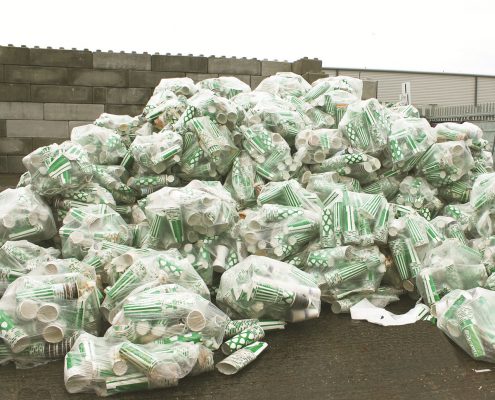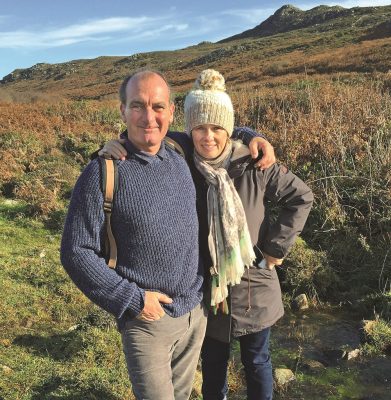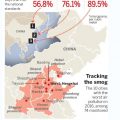
Claudi Williams and her husband Peter decided to drastically change the way they live their lives after swimming off the coast of the Spanish island of Mallorca.
The couple from Stroud, Gloucestershire, took their two sons on holiday there three years ago. After warming up on the beach, the family plunged into the sea and immediately noticed something was off.
“The water was like a strange soup, with plastic suspended under the surface, and wrapped around our limbs,” Claudi Williams said. “It felt very wrong.”
Claudi, who works at a sixth-form college in Oxford, set about researching the global problem of plastic pollution.
“I felt we needed to do something at home, we couldn’t wait for the manufacturers or the laws to change,” she said. “I realized that every purchase we make is a vote. If you buy something that is wrapped in plastic, you are saying to that manufacturer ‘I like this product, please make more’.”
On May 1, 2016, the family decided to stop buying plastic. Two years on, their Cotswold cottage is almost entirely free of the material.

Rice, pasta and grains are kept in glass containers. The family uses bamboo toothbrushes and makes its own toothpaste out of bicarbonate of soda, vegetable glycerin, and peppermint oil. Toilet paper is ordered from companies that use paper wrap, and cleaning detergents and shampoo are topped up at local stores that offer refills.
“Our rule was we wouldn’t buy anything plastic – whether it was short-term use, medium- or long-term, in order to force ourselves to think about every single purchase,” she said. “At the same time, we didn’t throw out anything that we already had at home.”
The Williams family says it is not “holier than thou” about the cause, and recognizes there are many crucial uses for plastic in modern society.
“Plastic is a wonderful and useful invention,” Claudi said. “It has important uses in almost every area of our lives. The problem is that we have gotten bad at distinguishing between the important uses and the unnecessary ones.”
The Williams family’s lifestyle is in stark contrast to that of the majority of Britons.The average European consumes 100 kilograms of plastic a year, compared with 20 kilograms in Asia, according to environmental organization Friends of the Earth.
Increasing awareness of the global problem of plastic pollution has led many Britons to seek alternatives to plastic. Companies that deliver milk in glass bottles are reporting record numbers of registrations. Hundreds of thousands of people have signed petitions calling on supermarkets to stop using plastic packaging. And the government is looking to phase out the use of single-use plastics.
“I feel really positive about it,” Williams said. “People have been trying to highlight this issue for a long time, but I feel a difference now. It has become so urgent and visible in the mainstream. Once we get this into legislation and manufacturers have to make changes, I’m optimistic we won’t go back.”
Ways to live without plastic
Here are tips from the Williams family on how to reduce your use of plastic
1. Buy only unpackaged fruit and vegetables
2. Avoid plastic bottles and buy drinks, oil etc. in glass bottles
3. Get your cheeses wrapped in paper
4. Ask your butcher and fishmonger if you can bring your own boxes
5. Give up Tetra Pak and make your own nut milks
6. Invest in stainless steel water bottles and refill on the go
7. Make your own packed lunches and carry hot drinks in thermos flasks
8. Get milk delivered in glass bottles
9. Buy bread in paper bags
10. Switch to bamboo toothbrushes and try out a simple toothpaste recipe
11. Find your nearest refill place for laundry and washing up detergents
12. Try out shampoo bars and use soap instead of shower gels
13. Switch from tea bags to tea leaves – most tea bags contain plastic
14. Give up ready-made meals
15. Make your own hummus, dips, snacks, biscuits and crackers


